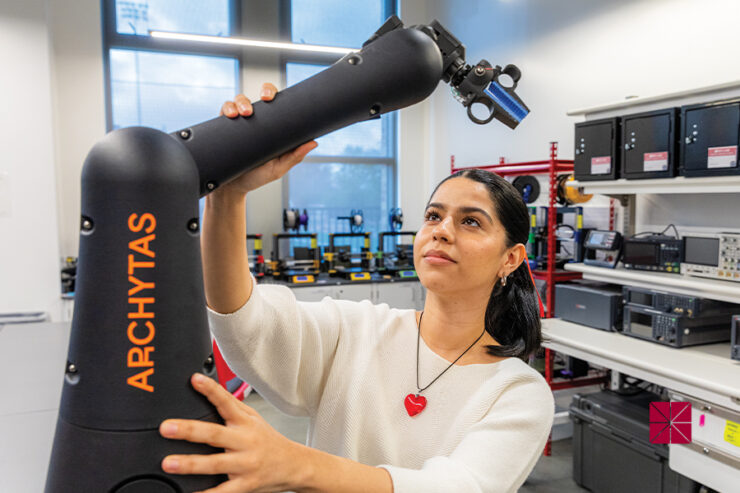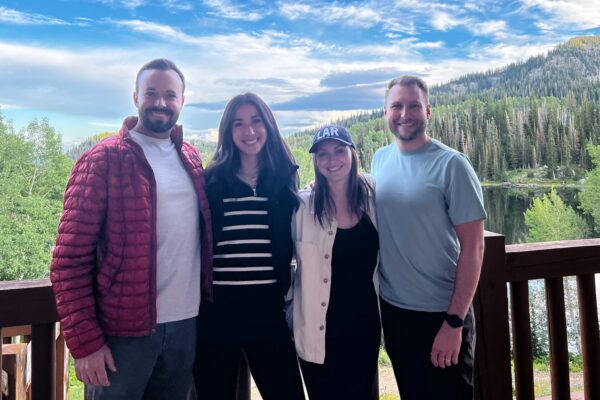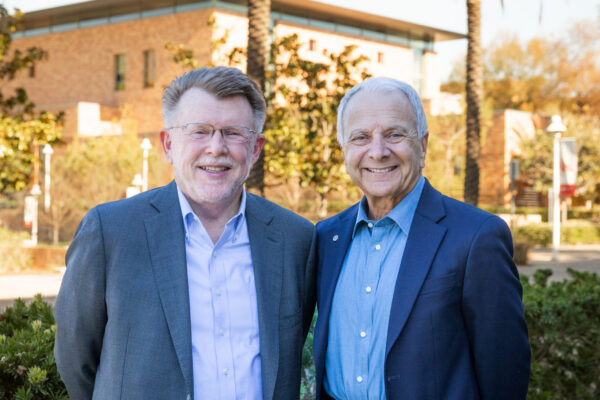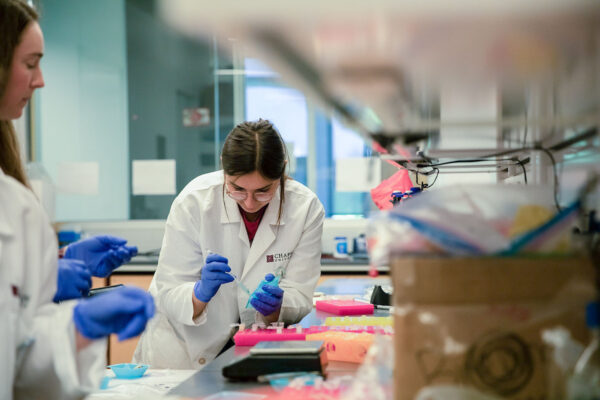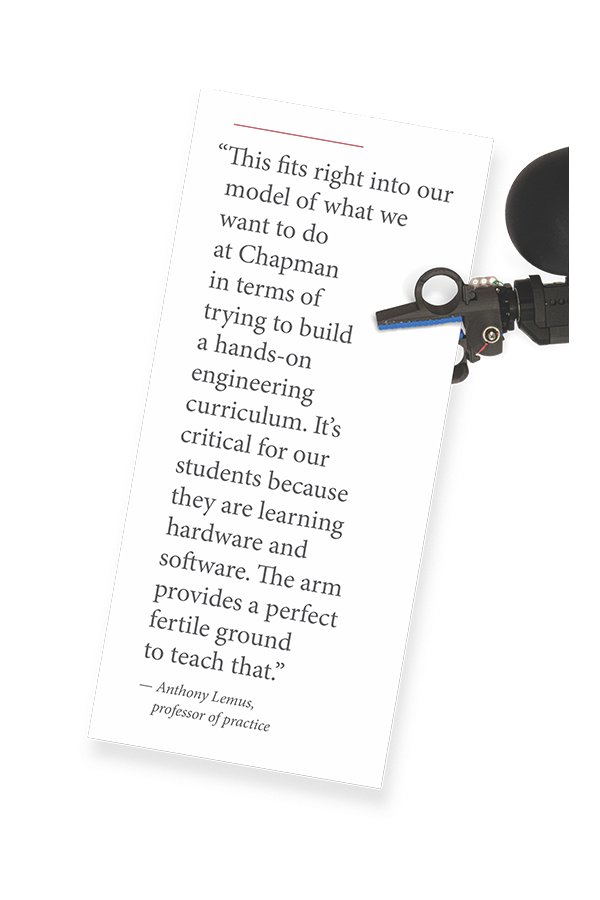 Connor Martindale didn’t always plan to work in robotics. But his experiences operating a robotic arm at Fowler School of Engineering and his internship at the company that produced the arm helped him find his passion.
Connor Martindale didn’t always plan to work in robotics. But his experiences operating a robotic arm at Fowler School of Engineering and his internship at the company that produced the arm helped him find his passion.
Like Martindale, any student at Fowler has the opportunity to use the two robotic arms from Irvine-based Archytas Automation. Using the lightweight machine—which can sort coffee beans and flip burgers—trains students in critical components of hands-on engineering, preparing them for a seamless transition into the industry. Partnerships with reputable local companies also give students the opportunity to land internships and start building a network to further their careers.
“I was super lucky to have all the resources that Fowler made available to me,” said Martindale, who earned a BS in data science from Fowler. “Focusing on hands-on skills and having access to professors with great industry contacts who are actually invested in our success really helps prepare us so that when we get out into the real world, we are ready for it.”
Martindale was able to secure a summer internship with Archytas in June 2023 and continued to work part-time with the company throughout his senior year. In his role, he helped map out and improve the entire manufacturing process for the robotic arms. The experience helped Martindale get a firsthand view of manufacturing and prepared him for his career.
Currently, Martindale is working as an electromechanical engineer at the Anaheim robotics company Kazvu Labs.
“Getting that experience in making a process more efficient was what I was most grateful for,” Martindale said. “I was used to working on projects from scratch, so it was a unique challenge to take something that’s already being done and improve on it. It’s made a huge difference for me at work, being able to come into this job having already worked in a professional environment with high-level tools.”
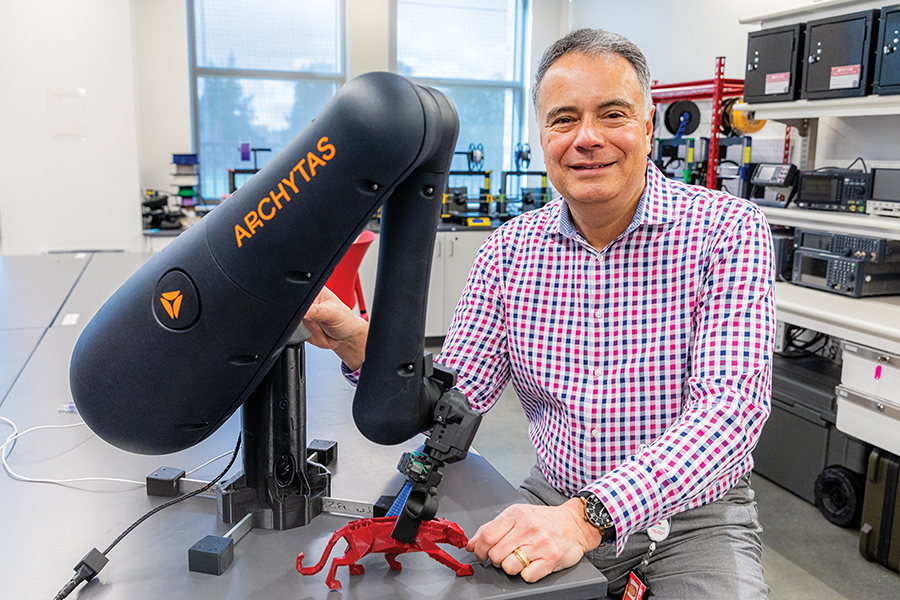
Hands-On Experiences
Professor Anthony Lemus, who runs the industry relations program for Fowler, facilitated the partnership with Archytas and purchased the arms in 2023. They were incorporated into classes to help educate students on control systems—how to control arms and other robotics.
Lemus said the robotics equipment supports the academic goal to promote practical, hands-on engineering training. Lemus works with industry partners to get hands-on labs into the curriculum and secure internships and job opportunities for students.
Archytas, which specializes in educational robotics, was a perfect partner.
“This fits right into our model of what we want to do at Chapman in terms of trying to build a hands-on engineering curriculum,” Lemus said. “It’s critical for our students because they are learning hardware and software. The arm is a perfect fertile ground to teach that.”
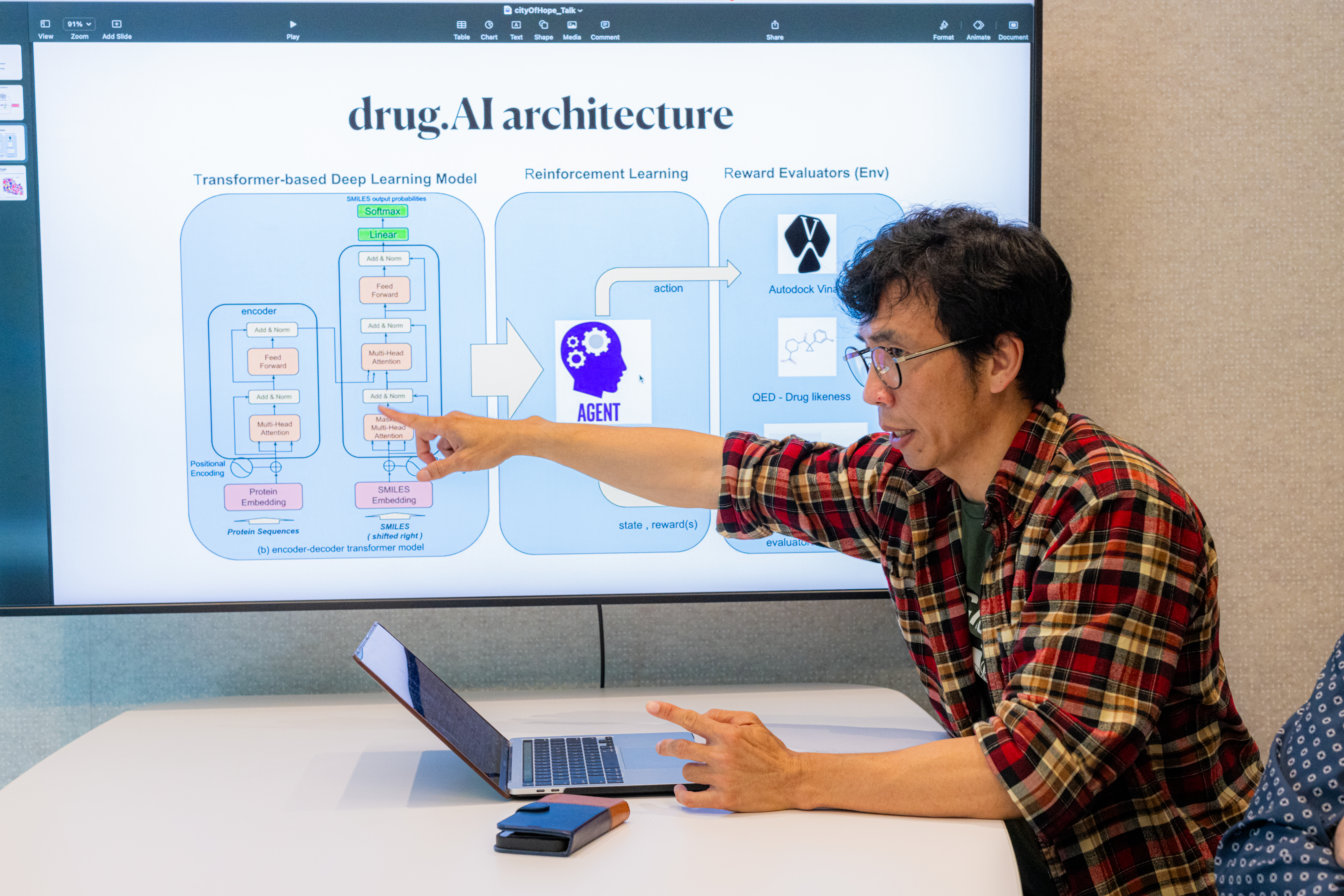
The Archytas robotic arm is unique among robotic arms. It is 3D printed out of lightweight material. This is particularly beneficial for a classroom because it’s much more mobile than other robotics.
Another unique component to the robotic arm is it runs off an Arduino microcontroller, which is an open-source electronics platform. Fowler students are already trained to program these microcontrollers, so they can put their knowledge to use by programming commands into the arm.
“The students get to have these right at their desks,” Lemus said. “That’s the uniqueness of this arm. And it gives them the opportunity to understand that one-to-one relationship between programming and movement.”
The robotic arm is also a perfect tool to teach process engineering, which is concerned with industrial processing and the steps it takes to deliver a product to a customer. The subject is a critical part of the engineering world and the Fowler curriculum.
“Most of the things that we create, like assembling a car or flipping burgers, you can use an automated arm to do those things,” Lemus said. “So these students are getting firsthand experience in process engineering.”
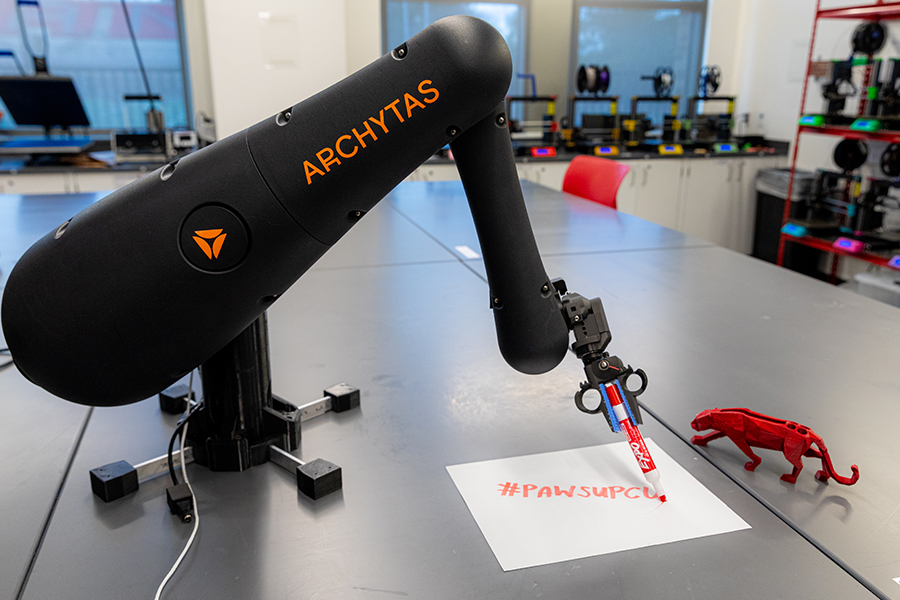
Impactful Partnerships
With Archytas and other local partners, Fowler is establishing a pipeline of top talent that benefits the university, students and local companies.
Karen Caswelch, co-founder and chief operating officer at Archytas, believes the personalized, real-world approach to curriculum at the school perfectly aligns with her company.
“What I like so much about Fowler is it is a practical engineering school,” Caswelch said. “It’s not just sitting in a classroom, but it’s learning the concept and then figuring out how to apply that in real life. The flexibility, creativity and hands-on learning are all things that we, as a business, are also trying to do.”
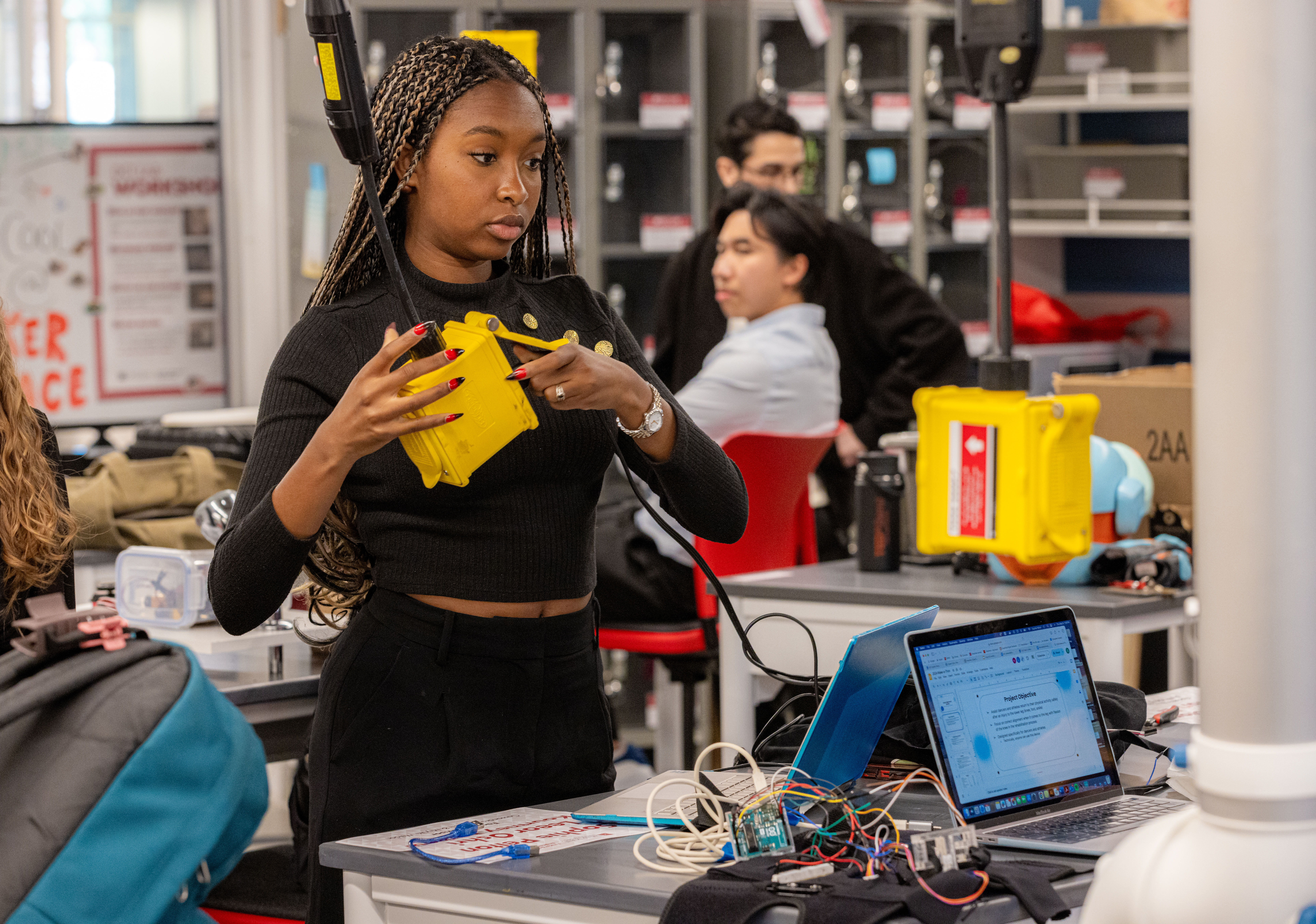
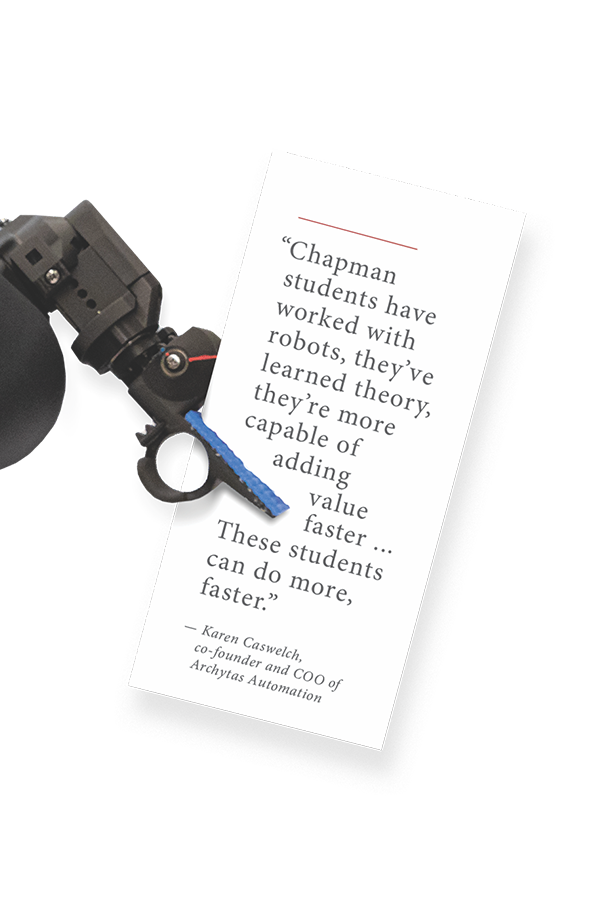 Companies that hire recent graduates prefer individuals who can quickly add value to the business. Many young professionals may have only learned theory and haven’t had the hands-on opportunities that are regularly available to Fowler students, who work with 3D printers, industrial machinery and advanced electronics equipment.
Companies that hire recent graduates prefer individuals who can quickly add value to the business. Many young professionals may have only learned theory and haven’t had the hands-on opportunities that are regularly available to Fowler students, who work with 3D printers, industrial machinery and advanced electronics equipment.
Caswelch pointed out that Martindale embodied this concept and he was a “top employee.”
“Chapman students have worked with robots, they’ve learned theory, they’re more capable of adding value faster than a student without those experiences,” Caswelch said. “These students can do more, faster.”
Another unique trait that Fowler students exhibit is adaptability. This stems from the interdisciplinary nature of the curriculum at the school, which equips students with a diverse skill set and a holistic understanding of complex issues.
“I really appreciate this culture of interdisciplinary interaction at Fowler,” Caswelch said. “If you think about robotics, it’s electronics and mechanical. Even though you don’t have a mechanical engineering degree at Chapman, all the students have the ability to develop, create and understand manufacturing.”
